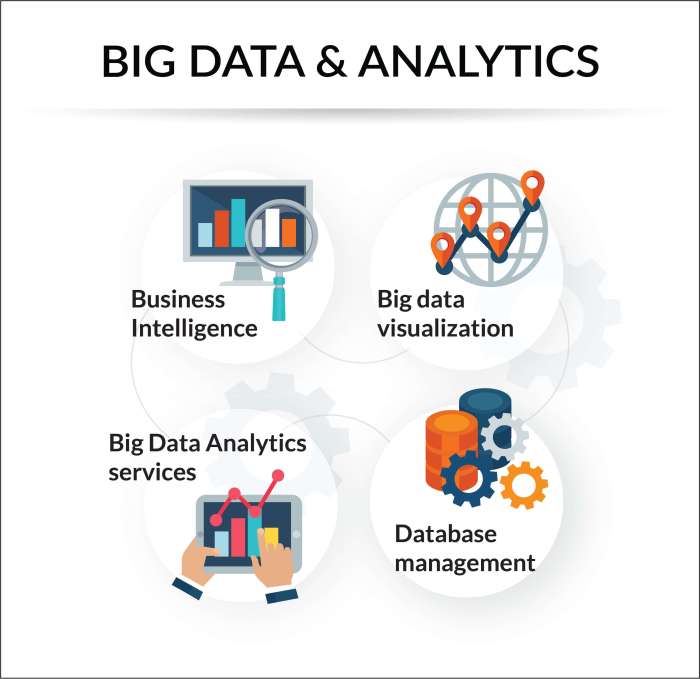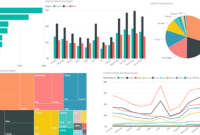Big Data analytics, a powerful tool in today’s business landscape, holds the key to unlocking valuable insights that drive strategic decision-making and innovation. Dive into the world of Big Data analytics to discover how it’s transforming industries and shaping the future of business operations.
Importance of Big Data Analytics
In today’s digital age, the importance of leveraging Big Data analytics cannot be overstated. With the ever-increasing volume of data being generated daily, businesses have a wealth of information at their fingertips that can be harnessed to gain valuable insights and make informed decisions.
For companies dealing with massive volumes of data, implementing Big Data BI solutions is essential. These tools enable businesses to extract, process, and analyze large datasets to uncover valuable insights that can drive strategic decision-making and improve overall performance.
Examples of Industries Benefiting from Big Data Analytics
- Retail: Retailers use Big Data analytics to analyze customer behavior, optimize pricing strategies, and personalize marketing campaigns.
- Healthcare: Healthcare providers utilize Big Data analytics to improve patient outcomes, optimize operations, and reduce costs.
- Finance: Financial institutions leverage Big Data analytics for fraud detection, risk management, and customer segmentation.
How Big Data Analytics Drives Strategic Decision-Making
Big Data analytics empowers organizations to make strategic decisions based on data-driven insights rather than gut feelings or intuition. By analyzing large volumes of data in real-time, businesses can identify trends, patterns, and correlations that may not be immediately apparent, allowing them to adjust their strategies proactively.
When it comes to enhancing decision-making processes and gaining valuable insights, Business Intelligence tools play a crucial role in today’s competitive business landscape. These tools help organizations analyze data effectively, identify trends, and make informed decisions based on real-time information.
Components of Big Data Analytics

Big Data analytics involves several key components that work together to extract valuable insights from vast amounts of data. These components include data collection, data processing, and data analysis.
Data Collection
Data collection is a crucial component of Big Data analytics as it involves gathering large volumes of structured and unstructured data from various sources. This data can come from social media, sensors, websites, mobile apps, and other sources. The quality and quantity of data collected play a significant role in the accuracy and effectiveness of the analysis.
- Utilizes data from multiple sources such as customer interactions, transactions, and operational data.
- Includes structured data (e.g., databases) and unstructured data (e.g., text, images).
- Requires data cleaning and transformation to ensure accuracy and consistency.
Data Processing and Analysis
Data processing and analysis are essential steps in Big Data analytics that involve transforming raw data into meaningful insights. This process includes cleaning, organizing, and analyzing data to identify patterns, trends, and relationships that can drive informed decision-making.
Data processing involves cleansing, aggregating, and structuring data for analysis.
- Utilizes advanced algorithms and statistical techniques to uncover insights.
- Helps in identifying correlations and causations within the data.
- Enables businesses to make data-driven decisions and predictions.
Tools and Technologies for Big Data Analytics

Big Data analytics relies on a variety of tools and technologies to process, analyze, and derive insights from massive datasets. These tools play a crucial role in helping organizations make data-driven decisions and gain a competitive edge in today’s fast-paced business environment.
Popular Tools and Technologies
- Hadoop: An open-source framework that allows for the distributed processing of large datasets across clusters of computers.
- Apache Spark: A fast and general-purpose cluster computing system that provides in-memory processing capabilities for big data analytics.
- Apache Kafka: A distributed event streaming platform that is commonly used for building real-time data pipelines and streaming applications.
- TensorFlow: An open-source machine learning framework developed by Google for building and training deep learning models.
Comparison of Software Platforms
- Apache Hadoop vs. Apache Spark: While both are popular choices for big data processing, Hadoop is more suitable for batch processing, whereas Spark excels in real-time processing and iterative algorithms.
- Cloudera vs. Hortonworks: These are two major vendors offering Hadoop-based solutions, with Cloudera known for its comprehensive platform and Hortonworks focusing on open-source offerings.
Cloud Computing in Big Data Analytics
Cloud computing has revolutionized Big Data analytics by providing scalable and cost-effective solutions for storing, processing, and analyzing large volumes of data. Cloud platforms like Amazon Web Services (AWS), Microsoft Azure, and Google Cloud Platform offer a range of services, such as data storage, compute power, and analytics tools, making it easier for organizations to leverage Big Data analytics without the need for extensive infrastructure investment.
Challenges in Big Data Analytics Implementation
Implementing Big Data analytics projects comes with its own set of challenges that organizations need to address to ensure successful outcomes. These challenges can range from technical issues to data quality concerns and scalability problems. Below, we will highlight some common challenges faced when implementing Big Data analytics projects and discuss strategies to overcome them.
Data Quality Challenges
Maintaining data quality is crucial in Big Data analytics, as the sheer volume of data can lead to errors and inconsistencies. Poor data quality can result in inaccurate insights and decisions, ultimately impacting business outcomes. Organizations must implement data quality processes and tools to clean, validate, and enrich data before analysis. This ensures that the data used for analysis is reliable and accurate, leading to more meaningful insights.
Data Privacy and Security Concerns
Another significant challenge in Big Data analytics implementation is ensuring data privacy and security. With the increasing amount of data being collected and analyzed, organizations need to prioritize data protection to prevent breaches and unauthorized access. Implementing robust security measures, such as encryption, access controls, and compliance with data protection regulations, is essential to safeguard sensitive information and maintain trust with customers.
Scalability Challenges, Big Data analytics
As data volumes continue to grow, organizations face scalability challenges in Big Data analytics. Traditional systems may struggle to handle the large-scale processing requirements of Big Data analytics projects. To overcome scalability challenges, organizations can adopt cloud-based solutions and distributed computing frameworks like Hadoop and Spark. These technologies enable organizations to scale their analytics infrastructure according to the growing data demands, ensuring optimal performance and efficiency.
Real-world Applications of Big Data Analytics

Big Data analytics has revolutionized various industries, including healthcare, marketing, and finance, by leveraging large volumes of data to extract valuable insights and drive decision-making processes.
Healthcare Predictive Analytics
In the healthcare sector, Big Data analytics plays a crucial role in predictive analytics to improve patient outcomes and optimize healthcare operations. By analyzing patient data, medical records, and treatment histories, healthcare providers can predict potential health risks, identify patterns in disease progression, and personalize treatment plans. For example, predictive analytics can help in early detection of diseases, reducing readmission rates, and improving patient care quality.
Optimizing Marketing Campaigns
Big Data analytics is extensively used in the marketing industry to optimize campaigns, enhance customer targeting, and improve marketing ROI. By analyzing customer behavior, preferences, and interactions across various channels, marketers can create personalized campaigns, identify the most effective marketing channels, and predict consumer trends. For instance, through sentiment analysis and social media monitoring, companies can tailor their marketing strategies to meet customer expectations and increase engagement.
Transforming the Finance Industry
In the finance sector, Big Data analytics is transforming traditional banking and financial services by enabling data-driven decision-making, fraud detection, risk management, and personalized customer experiences. By analyzing transaction data, market trends, and customer behavior, financial institutions can detect anomalies, prevent fraudulent activities, and offer customized financial products. For example, banks use predictive analytics to assess credit risk, detect money laundering, and improve customer satisfaction through personalized recommendations.
In conclusion, Big Data analytics stands as a game-changer in the realm of data-driven decision-making, offering unparalleled opportunities for businesses to thrive and succeed in the evolving digital age. Embrace the power of Big Data analytics to stay ahead of the curve and unlock new possibilities for growth and innovation.
Utilizing advanced Data analytics tools is vital for organizations looking to optimize their data-driven strategies. These tools empower businesses to interpret complex data sets, discover patterns, and gain actionable insights that can lead to improved operational efficiency and competitive advantage.




